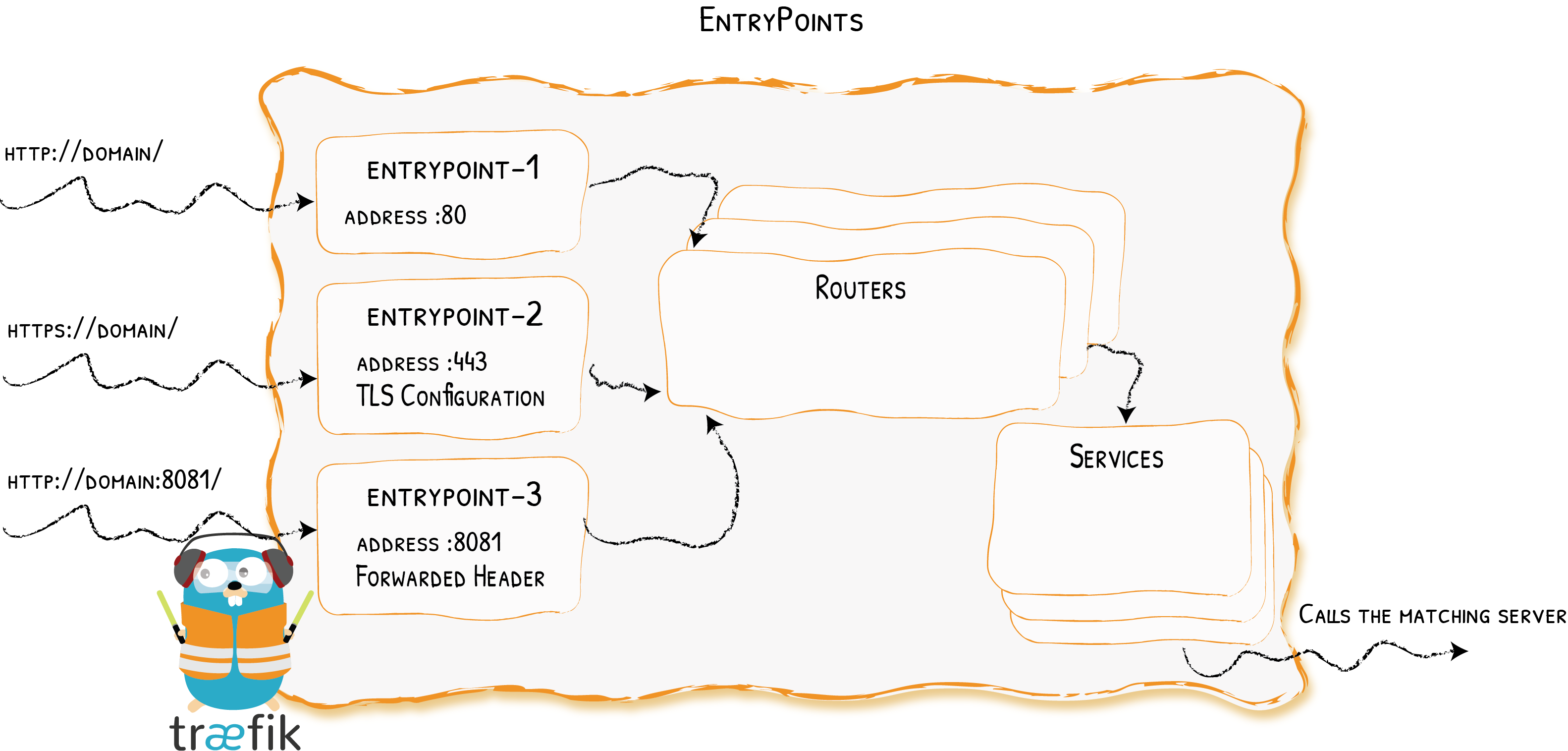9.3 KiB
EntryPoints
Opening Connections for Incomming Requests {: .subtitle }
Entrypoints are the network entry points into Traefik. They can be defined using:
- a port (80, 443, ...)
- SSL (Certificates, Keys, authentication with a client certificate signed by a trusted CA, ...)
Configuration Examples
??? example "HTTP only"
```toml
[entryPoints]
[entryPoints.http]
address = ":80"
```
We define an `entrypoint` called `http` that will listen on port `80`.
??? example "HTTP & HTTPS"
```toml
[entryPoints]
[entryPoints.http]
address = ":80"
[entryPoints.https]
address = ":443"
[entryPoints.https.tls]
[[entryPoints.https.tls.certificates]]
certFile = "tests/traefik.crt"
keyFile = "tests/traefik.key"
```
- Two entrypoints are defined: one called `http`, and the other called `https`.
- `http` listens on port `80`, and `https` on port `443`.
- We enabled SSL on `https` by giving it a certificate and a key.
!!! note
In the example, `http` and `https` are the names for the entrypoints and have nothing to do with the underlying protocol.
We could have written `entryPoints.foo` and `entryPoints.bar` instead.
!!! tip "Automatic HTTPS with ACME"
If you don't have certificate files and wish to automatically enable HTTPS, you should have a look at one of Traefik's most praised feature: [ACME & Let's Encrypt integration](./acme.md)
??? example "Client Certificate Authentication"
```toml
[entryPoints]
[entryPoints.https]
address = ":443"
[entryPoints.https.tls]
[entryPoints.https.tls.ClientCA]
files = ["tests/clientca1.crt", "tests/clientca2.crt"]
optional = false
[[entryPoints.https.tls.certificates]]
certFile = "tests/traefik.crt"
keyFile = "tests/traefik.key"
```
- We enabled SSL on `https` by giving it a certificate and a key.
- Files containing Certificate Authorities (PEM format) were added.
!!! note "Multiple CAs"
It is possible to have multiple CA:s in the same file or keep them in separate files.
Configuration
General
Entrypoints are part of the static configuration. You can define them using a toml file, CLI arguments, or a key-value store. See the complete reference for the list of available options.
??? example "Using the CLI"
Here is an example of using the CLI to define `entrypoints`:
```shell
--entryPoints='Name:http Address::80'
--entryPoints='Name:https Address::443 TLS'
```
!!! note
The whitespace character (` `) is the option separator, and the comma (`,`) is the value separator for lists.
The option names are case-insensitive.
!!! warning "Using Docker Compose Files"
The syntax for passing arguments inside a docker compose file is a little different. Here are two examples.
```yaml
traefik:
image: traefik
command:
- --defaultentrypoints=powpow
- "--entryPoints=Name:powpow Address::42 Compress:true"
```
or
```yaml
traefik:
image: traefik
command: --defaultentrypoints=powpow --entryPoints='Name:powpow Address::42 Compress:true'
```
TLS
Static Certificates
To add SNI support, define certFile and keyFile.
[entryPoints]
[entryPoints.https]
address = ":443"
[entryPoints.https.tls]
[[entryPoints.https.tls.certificates]]
certFile = "integration/fixtures/https/snitest.com.cert"
keyFile = "integration/fixtures/https/snitest.com.key"
!!! note If you provide an empty TLS configuration, default self-signed certificates will be generated.
Dynamic Certificates
To add / remove TLS certificates while Traefik is running, the file provider supports Dynamic TLS certificates in its [[tls]] section.
Mutual Authentication
Traefik supports both optional and non optional (defaut value) mutual authentication.
- When
optional = false, Traefik accepts connections only from client presenting a certificate signed by a CA listed inClientCA.files. - When
optional = true, Traefik authorizes connections from client presenting a certificate signed by an unknown CA.
??? example "Non Optional Mutual Authentication"
In the following example, both `snitest.com` and `snitest.org` will require client certificates.
```toml
[entryPoints]
[entryPoints.https]
address = ":443"
[entryPoints.https.tls]
[entryPoints.https.tls.ClientCA]
files = ["tests/clientca1.crt", "tests/clientca2.crt"]
optional = false
[[entryPoints.https.tls.certificates]]
certFile = "integration/fixtures/https/snitest.com.cert"
keyFile = "integration/fixtures/https/snitest.com.key"
[[entryPoints.https.tls.certificates]]
certFile = "integration/fixtures/https/snitest.org.cert"
keyFile = "integration/fixtures/https/snitest.org.key"
```
!!! note "ClientCA.files"
You can use a file per `CA:s`, or a single file containing multiple `CA:s` (in `PEM` format).
`ClientCA.files` is not optional: every client will have to present a valid certificate. (This requirement will apply to every server certificate declared in the entrypoint.)
Minimum TLS Version
??? example "Min TLS version & cipherSuites"
```toml
[entryPoints]
[entryPoints.https]
address = ":443"
[entryPoints.https.tls]
minVersion = "VersionTLS12"
cipherSuites = [
"TLS_ECDHE_RSA_WITH_AES_128_GCM_SHA256",
"TLS_RSA_WITH_AES_256_GCM_SHA384"
]
[[entryPoints.https.tls.certificates]]
certFile = "integration/fixtures/https/snitest.com.cert"
keyFile = "integration/fixtures/https/snitest.com.key"
[[entryPoints.https.tls.certificates]]
certFile = "integration/fixtures/https/snitest.org.cert"
keyFile = "integration/fixtures/https/snitest.org.key"
```
Strict SNI Checking
With strict SNI checking, Traefik won't allow connections without a matching certificate.
??? example "Strict SNI"
```toml
[entryPoints]
[entryPoints.https]
address = ":443"
[entryPoints.https.tls]
sniStrict = true
[[entryPoints.https.tls.certificates]]
certFile = "integration/fixtures/https/snitest.com.cert"
keyFile = "integration/fixtures/https/snitest.com.key"
```
Default Certificate
Traefik can use a default certificate for connections without an SNI, or without a matching domain.
If no default certificate is provided, Traefik generates a self-signed and use it instead.
??? example "Setting a Default Certificate"
```toml
[entryPoints]
[entryPoints.https]
address = ":443"
[entryPoints.https.tls]
[entryPoints.https.tls.defaultCertificate]
certFile = "integration/fixtures/https/snitest.com.cert"
keyFile = "integration/fixtures/https/snitest.com.key"
```
!!! note "Only One Default Certificate"
There can only be one `defaultCertificate` per entrypoint.
ProxyProtocol
Traefik supports ProxyProtocol.
??? example "Enabling Proxy Protocol with Trusted IPs"
```toml
[entryPoints]
[entryPoints.http]
address = ":80"
[entryPoints.http.proxyProtocol]
trustedIPs = ["127.0.0.1/32", "192.168.1.7"]
```
IPs in `trustedIPs` only will lead to remote client address replacement: Declare load-balancer IPs or CIDR range here.
??? example "Insecure Mode -- Testing Environnement Only"
In a test environments, you can configure Traefik to trust every incomming connection. Doing so, every remote client address will be replaced (`trustedIPs` won't have any effect)
```toml
[entryPoints]
[entryPoints.http]
address = ":80"
[entryPoints.http.proxyProtocol]
insecure = true
```
!!! warning "Queuing Traefik behind Another Load Balancer"
When queuing Traefik behind another load-balancer, make sure to configure Proxy Protocol on both sides.
Not doing so could introduce a security risk in your system (enabling request forgery).
Forwarded Header
You can configure Traefik to trust the forwarded headers information (X-Forwarded-*)
??? example "Trusting Forwarded Headers from specific IPs"
```toml
[entryPoints]
[entryPoints.http]
address = ":80"
[entryPoints.http.forwardedHeaders]
trustedIPs = ["127.0.0.1/32", "192.168.1.7"]
```
??? example "Insecure Mode -- Always Trusting Forwarded Headers"
```toml
[entryPoints]
[entryPoints.http]
address = ":80"
[entryPoints.http.forwardedHeaders]
insecure = true
```
